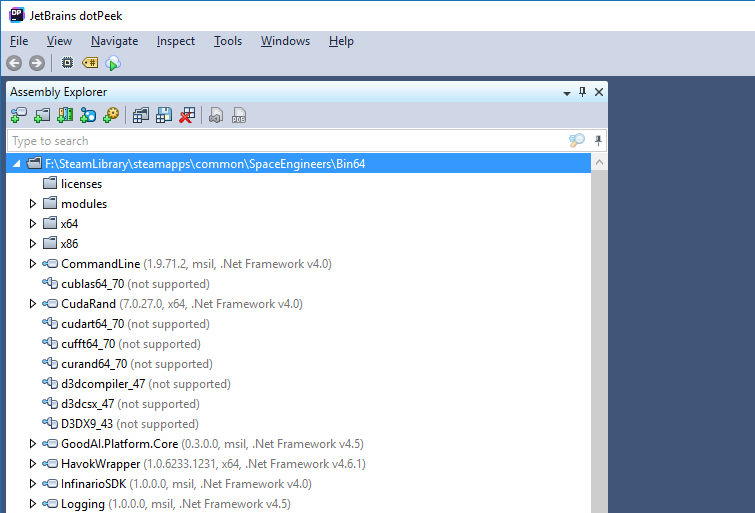This is a short note on how we can develop scripts for use in the game Space Engineers.
Background
A friend suggested Space Engineers to me, so I bought it and after some scavenging, mining and dying—I tried out the Programmable Block. To my surprise, it used C#!
There was one caveat though: the documentation was outdated and often unusable. I managed to piece together scripts using various posts on the official wiki, its Action List, and API List, plus some Reddit threads.
Eventually I realized—I could just disassemble the game and inspect it directly.
Disassembly
Using DotPeek from JetBrains (makers of ReSharper), I decompiled the game DLLs from the Steam install directory. This gave me full access to type definitions and method declarations.

Tip: Got an object you don’t recognize?
Use this trick inside your script to inspect the type:
throw new Exception(TheObject.GetType().FullName);
Or more safely, output it via:
Echo(TheObject.GetType().FullName);
Example Search
Say you’re working with a door and know the type is IMyDoor. A search in DotPeek reveals two relevant namespaces inside the Sandbox.Common assembly:
Sandbox.ModAPISandbox.ModAPI.Ingame
Looking closer, Sandbox.ModAPI.IMyDoor inherits from Sandbox.ModAPI.Ingame.IMyDoor. The latter is the one with the useful members like Status, OpenDoor(), etc.
In this image, we can see that Open is marked obsolete in favor of Status, but without external documentation, it’s hard to know how to use Status properly.
Placing the cursor on DoorStatus and pressing F12 brings us to its enum definition, clearing up any confusion.
Conclusion
Reverse engineering with DotPeek makes Space Engineers scripting much more accessible. Until official documentation catches up, it’s a fantastic way to explore the API.